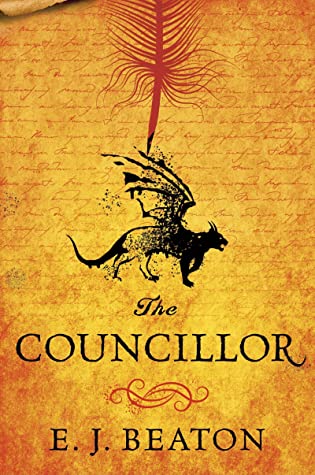
Genres: Queer Protagonists, Secondary World Fantasy
Representation: Bisexual MC, queernorm world, past F/F, secondary M/M, kink
Published on: 2nd March 2021
Goodreads

This Machiavellian fantasy follows a scholar's quest to choose the next ruler of her kingdom amidst lies, conspiracy, and assassination.
When the death of Iron Queen Sarelin Brey fractures the realm of Elira, Lysande Prior, the palace scholar and the queen’s closest friend, is appointed Councillor. Publically, Lysande must choose the next monarch from amongst the city-rulers vying for the throne. Privately, she seeks to discover which ruler murdered the queen, suspecting the use of magic.
Resourceful, analytical, and quiet, Lysande appears to embody the motto she was raised with: everything in its place. Yet while she hides her drug addiction from her new associates, she cannot hide her growing interest in power. She becomes locked in a game of strategy with the city-rulers – especially the erudite prince Luca Fontaine, who seems to shift between ally and rival.
Further from home, an old enemy is stirring: the magic-wielding White Queen is on the move again, and her alliance with a traitor among the royal milieu poses a danger not just to the peace of the realm, but to the survival of everything that Lysande cares about.
In a world where the low-born keep their heads down, Lysande must learn to fight an enemy who wears many guises… even as she wages her own battle between ambition and restraint.
I received this book for free from the publisher via NetGalley in exchange for an honest review. This does not affect my opinion of the book or the content of my review.
Highlights
~Machiavelli, if Machiavelli wasn’t a dick
~The presents are code and the code is snark
~Who gets the crown? Everybody!
~Snakes
~Forget knives, the assassins have fireballs
~Do you want some kink with your romance, madam?
~Silver > gold
~A very pretty quill
~Bookworms kick ass, actually
Everyone is touting this book as a Machiavellian fantasy, so the first thing you need to know about The Councillor is that yes, it absolutely is Machiavellian.
The second thing you need to know about The Councillor is that it is absolutely not Machiavellian at all.
The comparisons are easy to see: Lysande, our main character, is the advisor and companion to the queen of Elira, just as Machiavelli was involved in Florentine governance – he was in charge of government documents; Lysande is commonly called the queen’s scholar and knows the library inside-out and backwards. Machiavelli wrote The Prince, a treatise on how monarchs should control their kingdoms; when The Councillor begins, Lysande is writing An Ideal Queen, much the same except written for a world where ‘women and men’ are equals. Machiavelli believed rulers could use violence if the ends were good; Lysande idolises Sarelin, the Iron Queen who plucked her from obscurity with bloody hands.
But the thing is – describing something as ‘Machiavellian’ isn’t just to say there’s politics involved. It has the connotation of being unethical; the Oxford Dictionary defines it as ‘cunning, scheming, and unscrupulous, especially in politics’.
Is Lysande cunning? Yes. Does she scheme? Yep. But unscrupulous? No. And, which I find far more important – and which you should, too, given that she is tasked with choosing the Iron Queen’s successor! – does she believe, as Machiavelli did, that cruelty is more valuable than mercy in a leader? That it is better for a ruler to be feared than loved, if they can’t be both?
“Control people with a sword, and they resent you. Control them with a song, and they plead for more.”
No. She doesn’t. And that is really important.
So I wouldn’t call The Councillor Machiavellian. Because Lysande, drug addiction and all, has a better, more hopeful vision of what a kingdom can be than Machiavelli ever did. And although she never wanted the responsibility of deciding the fate of Elira, once she has it, she realises that she can do something with it.
Don’t get me wrong: she’s not an idealist, and she doesn’t start this journey believing the system needs changing. She’s grown up with the mantra restrain, constrain, subdue from her childhood in the orphanage, and the maxim of Elira’s central province – everything in its place – isn’t a whole lot better since it’s applied to people rather than cutlery, but it is something she more-or-less believes in. She believes in both. She lives her life by both. It takes her world being turned upside-down before she – slowly, gradually – starts to realise that maybe the world ought to stay upside-down.
the particular effects of living in a place where you feel like a jeweler’s rag, always in contact with diamonds and emeralds, but only to show up their quality.
Lysande has grown up a common scholar amongst the noble silverbloods (whose blood is not literally silver, it’s just a name), and you can bet that the ladies and lords have made their feelings about her felt. And yet it’s only when she suddenly holds the power of the crown – even if it’s only to give that crown to someone else – that she seems to realise that the way they’ve treated her isn’t all that great. Or rather, not all that great, and also undue. ‘Everything in its place’? Her place is now as Councillor, above all of them; above even the city-princes of Elira’s other provinces. And yet she’s still the same person she always was, so how can it be correct to treat her differently? Why was it okay to snub and slur her before and not now, though she hasn’t changed?
Everything in its place.
Do you call that a philosophy, she had once asked Sarelin, or do you call that a threat? Sarelin had become very busy cleaning her hunting-knife and had said nothing.
Maybe it wasn’t okay. Maybe it shouldn’t be. Maybe restrain, constrain, subdue is a terrible way to live. Maybe she should spread her wings and see exactly what she’s capable of.
Aside from classism, Lysande also has to confront Elira’s prejudices towards Elementals, persecuted magic-users who can control earth, air, fire, water, or what’s known simply as ‘mind’. Though she’s not one herself, her best friend Charice secretly is, and Lysande’s loyalty to Serelin, who had Elementals executed throughout her reign, is an uneasy bone of contention between the two friends. Although the issue is personal for Lysande in the form of Charice, it becomes bigger than that when she gains the power to potentially do something about the way Elementals are treated.
She traced the metaphor with a finger–Elira, the tapestry of many colors, climates and cities, sewn together by one leader.
At the expense of a certain type of people, her conscience added.
I’ll be honest, I wasn’t impressed, at first, with the concept of the Elementals – their magic seemed predictable and simple. And maybe it is, a little – theirs isn’t a very original magical ability – but more than what they can do, it’s their place in Eliran society – or the place they might be able to make, with Lysande’s help – that matters to the story, and that was a very interesting aspect to the book that I didn’t see coming. More, it becomes clear that the Elementals have their own culture, their own beliefs and traditions and rituals, which are going to be far more important than Lysande can believe. Maybe their magic isn’t super interesting (to me), but the Elementals as a people very much are.
And that attention to detail shines through in every part of Beaton’s worldbuilding, from social norms to fashion to food to flora to dance, and plenty more. The five provinces of Elira are almost five separate countries, culturally, and introducing the reader to them via the city-rulers who come to Lysande vying for the crown is an excellent move, showcasing the cultures each ruler has come from – and that has shaped them – rather than info-dumping the reader. But to be honest, I’d happily read all the info-dumps Beaton feels like writing, because her prose is stunning. She has a way of putting things into words that is simply breathtaking.
There were times when you wished for a shared language of breath, a grammar of the eyes, a vocabulary of touches, so that nothing needed to be risked through sound.
The Councillor is an intricate dance of culture and politics, and there are layers upon layers of secrets here – not least that of who, and what, killed the Iron Queen, and what, if anything, the White Queen – Sarelin’s long-time enemy, a fearsome Elemental – had to do with it. There are multiple factions all working towards incompatible goals, some of whom will compromise and become allies, some of whom will fight to the bitter end. There are no monoliths here, and even the characters and groups positioned against Lysande…most of them have pretty good reasons to be doing what they do. Black-and-white morality doesn’t have a place here; the situation just isn’t that simple. Acts may be unforgivable, but the motivations of Lysande’s enemies are sympathetic and complicated – just as they should be.
Every character we meet is three-dimensional and multi-layered, driven by their own desires, shaped by the cultures they come from; it’s impossible not to adore them all, and not to marvel at how real Beaton manages to make entirely fictional people. I challenge you not to fall in love with Litany, the young woman who becomes Lysande’s lady’s maid (and rather more), or Cassia, the city-ruler of Pyrrha, who shares Lysande’s interest in the extinct, magical creatures called chimeras. And it’s very difficult indeed not to be seduced by the wickedly intelligent, mysterious Luca, city-ruler of Rhime, who makes no friends and keeps all his secrets close.
I really have to take a moment to talk about the handling of sex and sexuality in this book, because it’s just wonderful. Beaton uses beautiful prose and a frank approach to normalise, not just a world in which men marry men and women marry women and no one bats an eye, but one in which a woman doesn’t have to be ashamed of her sexuality. I’m not talking about her bisexuality specifically – although I loved that Beaton made it clear that Lysande’s attraction towards women doesn’t cancel out her attraction to men, and vice versa, any more than her relationships with men make her heterosexual – but simply the fact that she feels desire, and knows herself desired, and enjoys sex, and none of these things are in any way shameful. Lysande experiences desire, and she acts on it when it’s reciprocated, without shame or guilt; she’s a sexual being, and the lack of commentary on that is its own commentary. Sex and romance are separate things here, and adults can have sex and enjoy each other’s companionship and that is enough; not every sexual relationship is a romantic one, or comes with strings attached, or is entered into in the hope that this person might be The One. And this is without mentioning that Lysande is something of a dominatrix, sexually: something which is also presented without comment, which the narrative does not shame or punish her for. It’s clear that Lysande never even considers that her ease with her sexuality, and sexual preferences, are anything to be ashamed or hesitant about. As she shouldn’t, because they aren’t! But it’s refreshing to see how well Beaton has stripped our world’s sexual hang-ups from the world of The Councillor. More casually sex-positive fantasy, please!
This is a chimera of a book; not just one thing or the other, subverting your expectations throughout, and yet harmonious and beautiful, all its pieces coming together into a marvelous whole. I couldn’t turn the pages fast enough, and I honestly can’t believe this is Beaton’s debut! It reads like the polished work of a master storyteller – it’s honestly perfect. There’s not one thing I’d change, or even critique. I love it even more than I expected to: there’s no question this is going to be one of the best books of the year, and one of the strongest debuts I’ve ever seen ever.
Long live the Councillor!






I have skimmed your review to get the gist as I haven’t read this yet – and you have confirmed this is one of my absolute must-reads for 2021. Can’t wait!
I’m 99.9% sure you’re going to love it SO MUCH!